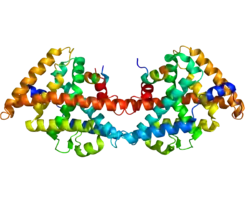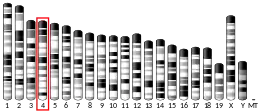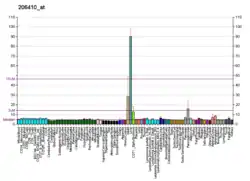Small heterodimer partner
The small heterodimer partner (SHP) also known as NR0B2 (nuclear receptor subfamily 0, group B, member 2) is a protein that in humans is encoded by the NR0B2 gene.[5] SHP is a member of the nuclear receptor family of intracellular transcription factors.[6] SHP is unusual for a nuclear receptor in that it lacks a DNA binding domain. Therefore, it is technically neither a transcription factor nor nuclear receptor but nevertheless it is still classified as such due to relatively high sequence homology with other nuclear receptor family members.
Function
The principal role of SHP appears to be repression of other nuclear receptors through association to produce a non-productive heterodimer.[7] The protein has also been identified as a mediating factor in the metabolic circadian clock [8] Research shows that it interacts with retinoid and thyroid hormone receptors, inhibiting their ligand-dependent transcriptional activation. In addition, interaction with estrogen receptors has been demonstrated, leading to inhibition of function. Studies suggest that the protein represses nuclear hormone receptor-mediated transactivation via two separate steps: competition with coactivators and the direct effects of its transcriptional repressor function.[5]
Structure and ligands
A crystal structure of the LBD-only SHP, generated by co-crystallisation with EID1, has been obtained. Instead binding to the usual AF-2 site, EID1 fills in the place of what is usually helix α1 of an LBD and makes SHP more soluble. The overall structure resembles the apo (ligandless) form of other LBDs. Some synthetic retinoid ligands can bind to SHP's LBD and promote its interaction with LXXLL-containing corepressors using the AF-2 site.[9]
Interactions
Large and medium scale Y2H experiments as well as text mining of the NR literature have highlighted the important role of SHP in the Nuclear Receptor dimerization network and its relatively highly connected status, compared to other NRs. [10]
Small heterodimer partner has been shown to interact with:
References
- GRCh38: Ensembl release 89: ENSG00000131910 - Ensembl, May 2017
- GRCm38: Ensembl release 89: ENSMUSG00000037583 - Ensembl, May 2017
- "Human PubMed Reference:". National Center for Biotechnology Information, U.S. National Library of Medicine.
- "Mouse PubMed Reference:". National Center for Biotechnology Information, U.S. National Library of Medicine.
- "Entrez Gene: NR0B2 nuclear receptor subfamily 0, group B, member 2".
- Lee HK, Lee YK, Park SH, Kim YS, Park SH, Lee JW, et al. (June 1998). "Structure and expression of the orphan nuclear receptor SHP gene". The Journal of Biological Chemistry. 273 (23): 14398–402. doi:10.1074/jbc.273.23.14398. PMID 9603951.
- Båvner A, Sanyal S, Gustafsson JA, Treuter E (December 2005). "Transcriptional corepression by SHP: molecular mechanisms and physiological consequences". Trends in Endocrinology and Metabolism. 16 (10): 478–88. doi:10.1016/j.tem.2005.10.005. PMID 16275121. S2CID 7884363.
- Wu N, Kim KH, Zhou Y, Lee JM, Kettner NM, Mamrosh JL, et al. (September 2016). "Small Heterodimer Partner (NR0B2) Coordinates Nutrient Signaling and the Circadian Clock in Mice". Molecular Endocrinology. 30 (9): 988–95. doi:10.1210/me.2015-1295. PMC 5004116. PMID 27427832.
- Zhi X, Zhou XE, He Y, Zechner C, Suino-Powell KM, Kliewer SA, et al. (January 2014). "Structural insights into gene repression by the orphan nuclear receptor SHP". Proceedings of the National Academy of Sciences of the United States of America. 111 (2): 839–44. Bibcode:2014PNAS..111..839Z. doi:10.1073/pnas.1322827111. PMC 3896210. PMID 24379397.
- Amoutzias GD, Pichler EE, Mian N, De Graaf D, Imsiridou A, Robinson-Rechavi M, et al. (July 2007). "A protein interaction atlas for the nuclear receptors: properties and quality of a hub-based dimerisation network". BMC Systems Biology. 1: 34. doi:10.1186/1752-0509-1-34. PMC 1971058. PMID 17672894.
- Gobinet J, Auzou G, Nicolas JC, Sultan C, Jalaguier S (December 2001). "Characterization of the interaction between androgen receptor and a new transcriptional inhibitor, SHP". Biochemistry. 40 (50): 15369–77. doi:10.1021/bi011384o. PMID 11735420.
- Klinge CM, Jernigan SC, Risinger KE (March 2002). "The agonist activity of tamoxifen is inhibited by the short heterodimer partner orphan nuclear receptor in human endometrial cancer cells". Endocrinology. 143 (3): 853–67. doi:10.1210/en.143.3.853. PMID 11861507.
- Lee YK, Dell H, Dowhan DH, Hadzopoulou-Cladaras M, Moore DD (January 2000). "The orphan nuclear receptor SHP inhibits hepatocyte nuclear factor 4 and retinoid X receptor transactivation: two mechanisms for repression". Molecular and Cellular Biology. 20 (1): 187–95. doi:10.1128/MCB.20.1.187-195.2000. PMC 85074. PMID 10594021.
- Brendel C, Schoonjans K, Botrugno OA, Treuter E, Auwerx J (September 2002). "The small heterodimer partner interacts with the liver X receptor alpha and represses its transcriptional activity". Molecular Endocrinology. 16 (9): 2065–76. doi:10.1210/me.2001-0194. PMID 12198243.
- Lee YK, Moore DD (January 2002). "Dual mechanisms for repression of the monomeric orphan receptor liver receptor homologous protein-1 by the orphan small heterodimer partner". The Journal of Biological Chemistry. 277 (4): 2463–7. doi:10.1074/jbc.M105161200. PMID 11668176.
- Nishizawa H, Yamagata K, Shimomura I, Takahashi M, Kuriyama H, Kishida K, et al. (January 2002). "Small heterodimer partner, an orphan nuclear receptor, augments peroxisome proliferator-activated receptor gamma transactivation". The Journal of Biological Chemistry. 277 (2): 1586–92. doi:10.1074/jbc.M104301200. PMID 11696534.
- Seol W, Choi HS, Moore DD (May 1996). "An orphan nuclear hormone receptor that lacks a DNA binding domain and heterodimerizes with other receptors". Science. 272 (5266): 1336–9. Bibcode:1996Sci...272.1336S. doi:10.1126/science.272.5266.1336. PMID 8650544. S2CID 32853062.
- Seol W, Hanstein B, Brown M, Moore DD (October 1998). "Inhibition of estrogen receptor action by the orphan receptor SHP (short heterodimer partner)". Molecular Endocrinology. 12 (10): 1551–7. doi:10.1210/me.12.10.1551. PMID 9773978.
Further reading
- Seol W, Choi HS, Moore DD (May 1996). "An orphan nuclear hormone receptor that lacks a DNA binding domain and heterodimerizes with other receptors". Science. 272 (5266): 1336–9. Bibcode:1996Sci...272.1336S. doi:10.1126/science.272.5266.1336. PMID 8650544. S2CID 32853062.
- Seol W, Hanstein B, Brown M, Moore DD (October 1998). "Inhibition of estrogen receptor action by the orphan receptor SHP (short heterodimer partner)". Molecular Endocrinology. 12 (10): 1551–7. doi:10.1210/me.12.10.1551. PMID 9773978.
- Lee YK, Dell H, Dowhan DH, Hadzopoulou-Cladaras M, Moore DD (January 2000). "The orphan nuclear receptor SHP inhibits hepatocyte nuclear factor 4 and retinoid X receptor transactivation: two mechanisms for repression". Molecular and Cellular Biology. 20 (1): 187–95. doi:10.1128/MCB.20.1.187-195.2000. PMC 85074. PMID 10594021.
- Johansson L, Båvner A, Thomsen JS, Färnegårdh M, Gustafsson JA, Treuter E (February 2000). "The orphan nuclear receptor SHP utilizes conserved LXXLL-related motifs for interactions with ligand-activated estrogen receptors". Molecular and Cellular Biology. 20 (4): 1124–33. doi:10.1128/MCB.20.4.1124-1133.2000. PMC 85230. PMID 10648597.
- Lu TT, Makishima M, Repa JJ, Schoonjans K, Kerr TA, Auwerx J, Mangelsdorf DJ (September 2000). "Molecular basis for feedback regulation of bile acid synthesis by nuclear receptors". Molecular Cell. 6 (3): 507–15. doi:10.1016/S1097-2765(00)00050-2. PMID 11030331.
- Nishigori H, Tomura H, Tonooka N, Kanamori M, Yamada S, Sho K, et al. (January 2001). "Mutations in the small heterodimer partner gene are associated with mild obesity in Japanese subjects". Proceedings of the National Academy of Sciences of the United States of America. 98 (2): 575–80. doi:10.1073/pnas.021544398. PMC 14629. PMID 11136233.
- Lee YK, Moore DD (January 2002). "Dual mechanisms for repression of the monomeric orphan receptor liver receptor homologous protein-1 by the orphan small heterodimer partner". The Journal of Biological Chemistry. 277 (4): 2463–7. doi:10.1074/jbc.M105161200. PMID 11668176.
- Nishizawa H, Yamagata K, Shimomura I, Takahashi M, Kuriyama H, Kishida K, et al. (January 2002). "Small heterodimer partner, an orphan nuclear receptor, augments peroxisome proliferator-activated receptor gamma transactivation". The Journal of Biological Chemistry. 277 (2): 1586–92. doi:10.1074/jbc.M104301200. PMID 11696534.
- Sanyal S, Kim JY, Kim HJ, Takeda J, Lee YK, Moore DD, Choi HS (January 2002). "Differential regulation of the orphan nuclear receptor small heterodimer partner (SHP) gene promoter by orphan nuclear receptor ERR isoforms". The Journal of Biological Chemistry. 277 (3): 1739–48. doi:10.1074/jbc.M106140200. PMID 11705994.
- Gobinet J, Auzou G, Nicolas JC, Sultan C, Jalaguier S (December 2001). "Characterization of the interaction between androgen receptor and a new transcriptional inhibitor, SHP". Biochemistry. 40 (50): 15369–77. doi:10.1021/bi011384o. PMID 11735420.
- Klinge CM, Jernigan SC, Risinger KE (March 2002). "The agonist activity of tamoxifen is inhibited by the short heterodimer partner orphan nuclear receptor in human endometrial cancer cells". Endocrinology. 143 (3): 853–67. doi:10.1210/en.143.3.853. PMID 11861507.
- Ogata M, Awaji T, Iwasaki N, Miyazaki S, Bell GI, Iwamoto Y (March 2002). "Nuclear translocation of SHP and visualization of interaction with HNF-4alpha in living cells". Biochemical and Biophysical Research Communications. 292 (1): 8–12. doi:10.1006/bbrc.2002.6593. PMID 11890664.
- Cao H, Hegele RA (2002). "Identification of polymorphisms in the human SHP1 gene". Journal of Human Genetics. 47 (8): 445–7. doi:10.1007/s100380200062. PMID 12181644.
- Brendel C, Schoonjans K, Botrugno OA, Treuter E, Auwerx J (September 2002). "The small heterodimer partner interacts with the liver X receptor alpha and represses its transcriptional activity". Molecular Endocrinology. 16 (9): 2065–76. doi:10.1210/me.2001-0194. PMID 12198243.
- Borgius LJ, Steffensen KR, Gustafsson JA, Treuter E (December 2002). "Glucocorticoid signaling is perturbed by the atypical orphan receptor and corepressor SHP". The Journal of Biological Chemistry. 277 (51): 49761–6. doi:10.1074/jbc.M205641200. PMID 12324453.
- Hung CC, Farooqi IS, Ong K, Luan J, Keogh JM, Pembrey M, et al. (May 2003). "Contribution of variants in the small heterodimer partner gene to birthweight, adiposity, and insulin levels: mutational analysis and association studies in multiple populations". Diabetes. 52 (5): 1288–91. doi:10.2337/diabetes.52.5.1288. PMID 12716767.
- Lai K, Harnish DC, Evans MJ (September 2003). "Estrogen receptor alpha regulates expression of the orphan receptor small heterodimer partner". The Journal of Biological Chemistry. 278 (38): 36418–29. doi:10.1074/jbc.M303913200. PMID 12842887.
- Kovacic A, Speed CJ, Simpson ER, Clyne CD (January 2004). "Inhibition of aromatase transcription via promoter II by short heterodimer partner in human preadipocytes". Molecular Endocrinology. 18 (1): 252–9. doi:10.1210/me.2003-0211. PMID 14593077.
External links
- small+heterodimer+partner+protein at the US National Library of Medicine Medical Subject Headings (MeSH)





